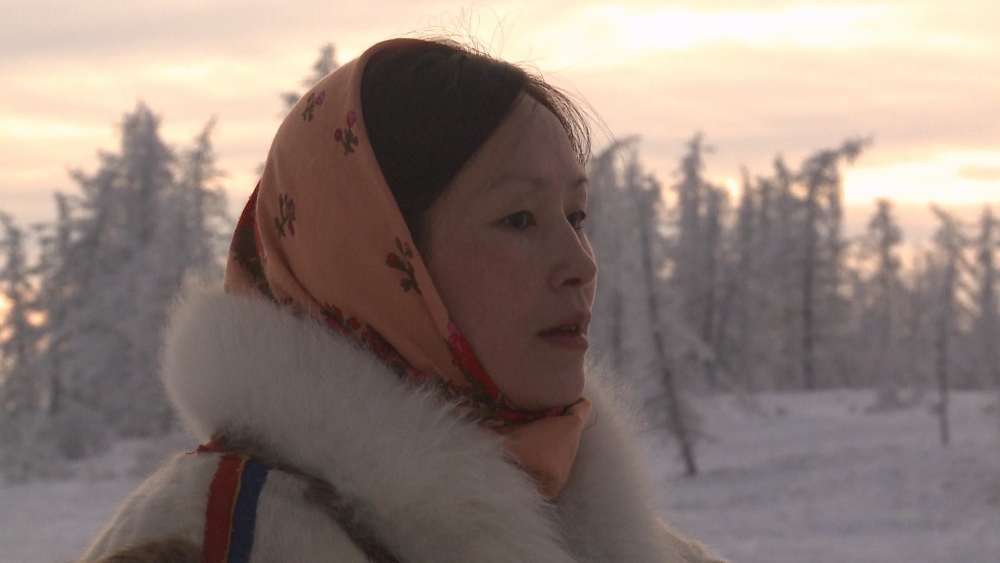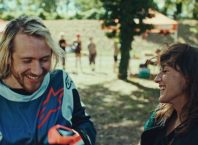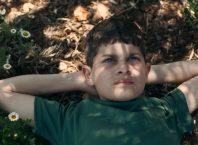
Smoking incessantly, punctuating her daily routine with graphic curses, offering little exposition and certainly no excuses, Ivanna is raising her five children in a small cabin in the Russian Tundra. Set on wooden runners, like a sled, the wood frame is covered by animal skins, which make its roof and walls. It’s about as big as a room. The film follows Ivanna and her children over the course of four years. In these close quarters, the presence of the camera is felt, yet it is not intrusive; it’s almost like a quiet member of the family who does not join the conversation, but whose presence is accepted by all, and who sees and hears everything. The Tundra is vast, with snow as far as the eye can see; the unrelenting cold and strong winds are a force to contend with, and survival is a daily battle.
Ivanna was born into the Nenets community, an ethnic group whose homeland is in northern arctic Russia, relying on hunting, fishing, and reindeer herding. Their traditional culture and way of life has been seriously impacted by several factors. Children are sent to boarding schools run by the government, causing a break in the transmission of community values and lore, and complicating their sense of cultural identity. Climate change, the expansion of oil and gas companies in the region, disruption of the reindeer’s migratory routes, and the depletion of fish population make it difficult to continue the traditional, nomadic life of the Nenets. Exposure to a wider world through school, the radio, and – where it’s available – the internet, reveals other ways of life, and perhaps evokes a yearning for something different.
None of this is explicitly stated in the film, but rather Ivanna and the children are observed as they go about their daily lives: fetching water in a bucket from a hole in the ice, rolling in the snow, sawing into a frozen fish, or rounding up the help of her few neighbors to turn the cabin around so that it will not tip over during a fierce windstorm. In one scene, Ivanna is combing her daughter Yulia’s hair, when one of the younger children comes in from the cold, all bundled up, and asks for help taking off his coat. Yulia finds this a teachable moment to tell her younger brother how she learned to take her own coat off by herself, encouraging him to do the same. It’s never too early to learn self-reliance. Later in the film, one sees a very small boy sitting on the floor, playing with a very big knife, jabbing at a piece of wood. It’s shocking to see, yet he seems to handle the knife rather well.
Ivanna tells very little about her life, yet the few things she says are significant. Talking about her youth and the experience of boarding school, she recalls that when she first arrived, she did not know how to climb stairs, because she had never seen stairs before. She met Gena, the father of her children, when she was 12 and he was 14. Her family took him in, after his parents drowned. By age 15 she was pregnant with her first child. One of her sons died, but that is all she reveals. Although the circumstances of her life are harsh in many ways, Ivanna endures, capable and feisty, seizing joy where she finds it – dancing with her children, singing Karaoke, growing plants in cups and old pots.
At one point, Ivanna and the children leave the Tundra to live with Gena in Tukhard. There, they have a larger home, with several rooms, and a computer. Although superficially the circumstances seem better, the emotional landscape is perilous. Gena is drunk to the point of incoherence most of the time, gets into fights, and becomes violent with Ivanna. There is an atmosphere of decay, neglect and aggression in the home. When one of her sons calls Ivanna a cunt, it is clear that he is emulating his father. A child sleeps on the floor, while on the table above him, the cat steps delicately, sniffing around three dead fish. It’s an indelible image, striking, sad, and ultimately, opaque.
Ivanna’s inner life, her thoughts and feelings remain as hidden from us as the Far North where she lives is remote from our own existence. We do not know the reasons for her choices, we may not agree with them, and we may not be able to understand them. Yet as she not only endures, but attacks each day with vigor, she is, in her own way, heroic.
Life of Ivanna will participate in the International Competition at Docaviv – the Tel Aviv International Documentary Festival which will take place from July 1 – 10, 2021. Tickets and additional information may be found on the Docaviv website: https://www.docaviv.co.il/2021-en/
Life of Ivanna
Russia/Norway/Finland/Estonia/2021/80 min/Russian with English and Hebrew subtitles
Director: Renato Borrayo Serrano; Script & Cinematography: Renato Borrayo Serrano, Daria Sidorova; Editing: Renato Borrayo Serrano, Inge-lise Langfeldt; Sound Design: Israel Bañeulos; Music: Timo Steiner





